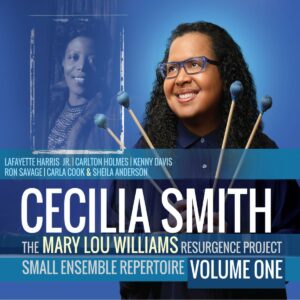Cecilia Smith Celebrates Mary Lou Williams
Cecilia Smith
The Mary Lou Williams Resurgence Project, Vol. 1: Small Ensemble Repertoire
Cecilia Smith, vibraphone, Lafayette Harris, Jr. & Carlton Holmes (piano/organ),
Kenny Davis (bass), Ron Savage (drums), Carla Cook (vocals)
Self-released
Mary Lou Williams was an extraordinarily gifted jazz pianist and composer, particularly prominent during the Swing band era, but also rightly held in esteem for her late modern jazz work “Zodiac Suite.” Among her accomplishments, she played with Benny Goodman and arranged for Duke Ellington. Vibraphonist Cecilia Smith has decided to commemorate her legacy with the recording The Mary Lou Williams Resurgence Project, Vol. 1: Small Ensemble Repertoire. Smith has been at work on Williams’s repertoire since 2000 and the Resurgence project has been granted an NEA American Masterpiece Award.
Smith incorporates material by Williams into her own original “Truth be Told for mlw,” in which she exchanges chord solos, and a puckish riff doubled by organ, with drum fills. Partway through, the quick phrases are juxtaposed with a slow blues drag. The uptempo time then returns, with ebullient solos from Cecilia Smith and pianist Carlton Holmes. The tune ends with the chordal soloing alternating with the phrases of the blues section.
Composed by Williams in honor of the philanthropist Doris Duke, “D.D.” features an elaborated blues progression built in chromatic seconds played midtempo. Smith’s solo exploits a variety of dense scalar patterns and then builds in syncopated substitutions on the tune’s original patterning. Harris’s piano solo reveals the underlying blues framework of the tune. After a brief turn by bassist Kenny Davis, the tune returns to complete the performance in traditional fashion.
Standards associated with Williams as a performer and arranger also feature prominently. A suave rendition of “Body and Soul” is a standout, as is Smith’s playing on “St. Louis Blues.” My favorite is the rendition of Dr. Billy Taylor’s “It’s a Grand Night for Swinging,” a tune to which over the course of her career Williams frequently returned. Here, the whole band plays the head in effusive fashion, with Carlton Holmes’s organ added to Harris’s piano-playing to fill out the rhythm section. Harris’s solo recalls Taylor’s voicings and fragments the melody into small subsections that then are developed. Smith cools things down a bit at the beginning of her solo, with repeated quarters succeeded by swinging eighths. It eventually becomes faster moving and more intricate, perfectly paced. Holmes’s succeeding solo is slinky, with a number of blues thirds complicating his melodies. Davis plays his ostinato riff solo. The return to the head trades fours and repeats to finish.
The recording’s last track is a second version of “Miss D.D.” This one is a couple minutes longer, allowing the group members to stretch out on their respective solos. Organ is more prominent and Davis’s bass riff more elaborate.
Smith’s first installment of The Mary Lou Williams Resurgence Project honors Williams with a sampling of her repertoire and further develops her material into stirring originals. I look forward to hearing what Smith does with a larger ensemble.
-Christian Carey
